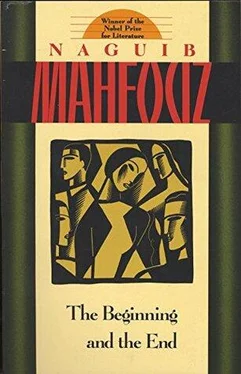Naguib Mahfouz - The Beginning and the End
Здесь есть возможность читать онлайн «Naguib Mahfouz - The Beginning and the End» весь текст электронной книги совершенно бесплатно (целиком полную версию без сокращений). В некоторых случаях можно слушать аудио, скачать через торрент в формате fb2 и присутствует краткое содержание. Год выпуска: 2016, Издательство: Anchor Books, Жанр: Классическая проза, на английском языке. Описание произведения, (предисловие) а так же отзывы посетителей доступны на портале библиотеки ЛибКат.
- Название:The Beginning and the End
- Автор:
- Издательство:Anchor Books
- Жанр:
- Год:2016
- ISBN:нет данных
- Рейтинг книги:4 / 5. Голосов: 1
-
Избранное:Добавить в избранное
- Отзывы:
-
Ваша оценка:
- 80
- 1
- 2
- 3
- 4
- 5
The Beginning and the End: краткое содержание, описание и аннотация
Предлагаем к чтению аннотацию, описание, краткое содержание или предисловие (зависит от того, что написал сам автор книги «The Beginning and the End»). Если вы не нашли необходимую информацию о книге — напишите в комментариях, мы постараемся отыскать её.
The Beginning and the End — читать онлайн бесплатно полную книгу (весь текст) целиком
Ниже представлен текст книги, разбитый по страницам. Система сохранения места последней прочитанной страницы, позволяет с удобством читать онлайн бесплатно книгу «The Beginning and the End», без необходимости каждый раз заново искать на чём Вы остановились. Поставьте закладку, и сможете в любой момент перейти на страницу, на которой закончили чтение.
Интервал:
Закладка:
Soothed by these words, Hussein murmured, “Don’t mention it. You deserve it.”
There’s nothing about this brother to be ashamed of, Hassanein thought. But for Nefisa’s past and Hassan’s present, I’d have been the happiest man on earth.
“Cheer up,” he said to his brother, with a feeling of delight. “I’ve begged Ahmad Bey Yousri to try to get you transferred to Cairo, and he promised me he’d do something about it.”
“Splendid! By the way, I have my annual leave now, so I’ll go back with you to Cairo.” He got off the bed. “Now go wash your face,” he said, “and brush off your suit; it’s covered with dust from the train. Why stay in this room? Let’s go into town.”
Hussein dressed in his suit and the two brothers set out for the streets of the town. They continued their conversation in a coffeehouse. Speaking at length of his life in Tanta, Hussein complained of his loneliness, how it had brought him to frequent this place, to spend no less than two hours on backgammon or conversation, before he returned to his room to read for an hour or so before falling asleep. The last book he had bought, he told Hassanein, was Socialism, by Ramsay MacDonald, translated into Arabic from the English, in which the author claimed that the socialist system did not run counter to religion, family, or morality.
Lonely and bored, he found pleasure, he said, in dreams of social reform, imagining the emergence of a better society than the present one and improvement in living conditions. The prospect of realizing his dreams without jeopardizing the religious creed he had imbibed early in childhood made his heart overflow with exuberance.
Hussein wondered whether his mother had divulged to his brother the secret that had driven her to pay him a visit nearly a year and a half ago, but since Hassanein made no mention of the matter, Hussein was confirmed in his early conclusion that his mother had said nothing about it. The thought, now reminding his calm and peaceful heart of past suffering, would have entirely ceased to trouble him but for a general feeling of longing for love and companionship. When he asked his brother about his fiancée, Hassanein answered vaguely. “She’s well, thanks be to God.” Hassanein wondered whether he should speak frankly to his brother about his change in attitude toward Bahia. Shying away from the revelation, he postponed it for some future time, for he knew in advance that Hussein would never approve of his motives and intentions. But their amiable, lengthy tête-à-tête induced him to broach the grave subject which preoccupied him most.
“Imagine how marvelous our life would have been,” Hassanein sighed, “but for Hassan and our family’s past.”
Hussein understood the sorrow and discontent underlying his brother’s sigh. “I believe our troubles are over now,” he said simply. “Besides, there’s nothing to be ashamed of in our family’s past. As for Hassan, it’s a pity, but he can do harm only to himself.”
Hassanein shook his head in disapproval. “I’ve learned that, as time went on, Hassan degenerated into a thug and a dealer in narcotics.”
Although Hussein’s view of his brother was negative, indeed, he could not possibly have imagined this fall into such an abyss. “No! Don’t say it!” he exclaimed in horror.
Disregarding the shock to his brother, Hassanein related what he had seen and heard on his latest visit to Hassan. Silent and sullen, Hussein listened. To break his brother’s protracted silence, Hassanein inquired, “What do you think?”
Hussein extended the palms of his hands as if to say, “What can we do about it?” “Alas!” he muttered. “Hassan was the victim of our father, and our father was the victim of his own empty pockets.”
“Can’t you persuade him to renounce his way of living?” Hassanein asked in fright.
“Whatever we do or say, he’ll never change it,” Hussein sighed. “The only possibility would be to provide him with enough money to start a new life. Can we afford it? That’s the question.”
The answer being too obvious, the two brothers exchanged despondent glances.
“Should we,” Hassanein asked sharply, “allow him to destroy our hopes by his wicked behavior?”
“He’s destroyed only himself.”
“And destroyed us, too. With a brother like him, how can we face the world? One day our names will appear in newspaper stories about arrests and crimes.”
Hussein sighed sorrowfully. His brother’s words revived thoughts that had often tormented him in his loneliness. “We aren’t to blame,” he said. “And we shouldn’t allow exaggerated fears to fill our hearts. Sooner or later we may be exposed to the slanders. But we won’t be able to face life unless we develop a measure of indifference.”
To Hassanein, his brother was either unaware of what he was saying or indifferent to the family’s good reputation, which he considered the foundation of all his hopes in life. But Hussein’s circumstances were different. He knew none of the friends of Hassanein, whose discovery of the family secrets his younger brother dreaded. Moreover, Hussein, not being ambitious, did not fear people who told tales. Offended at this lack of a sympathetic hearing from his brother, Hassanein regretted that he had confided his fears. At the moment, he was not only indignant toward his brother; he despised his calm resignation.
“Do we have the right to consider ourselves honorable people?” he exclaimed in a flash of anger.
“Why not?” Hussein inquired with surprise.
“Because we’ve straightened out the difficulties of our lives with tainted money!”
His eyes emitting sudden sparks of fury, Hussein silently stared at his brother’s face. Grief, long buried, surfaced in his consciousness, evoking with it the most somber memories.
“We had to defend ourselves,” he said sharply. “And even murder is justified in self-defense.”
Secretly relieved at his brother’s anger, Hassanein began to wonder at his own motive in confronting him with this painful revelation. Now they were separated by a wide gulf of silence; as the two brothers tired of it, their conversation drifted to other matters. But it took some time before the strain wore off and amiability was restored.
SEVENTY-FOUR
The two brothers returned together to Cairo a few days later for an unforgettable day in the life of the family. Samira gave Hussein a long kiss and Nefisa embraced him warmly. In the afternoon Hussein talked for an hour about Tanta and his life there as the two women listened attentively. Gazing at his mustache and his growing obesity, Nefisa was surprised by the changes that had taken place in him.
“Why do you imitate men while you’re still a child?” she said disapprovingly.
“I’m no longer a child.” Hussein grinned.
“We’re men and you’re our elder sister,” Hassanein said, laughing.
“In the past,” the girl said sharply, “I was your elder sister but from now on you look older. Do you understand?”
Turning to her mother, she inquired, “How do you like his mustache, which makes him appear older than he actually is and, for no reason, makes us age, too.”
It was noon. Hussein took off his clothes. Strange though the house appeared to him, it aroused feelings of deep attachment to home and family, his heart overflowing with tenderness and total relief: shelter at last in a safe harbor after sailing on uncharted seas. His eyes searched the study: the same old desk, the same few chairs, the same windowpane, the sheet of newspaper replacing the broken glass, all stirred dear memories. His bed had disappeared; evidently it had been sold, as if, like Hassan, he had ceased to be a member of the family. He understood, yet he could not help feeling melancholy and depressed. At this moment he was awakened from his thoughts when Nefisa said, as she left the room, “Give me two hours to prepare a good meal for you.”
Читать дальшеИнтервал:
Закладка:
Похожие книги на «The Beginning and the End»
Представляем Вашему вниманию похожие книги на «The Beginning and the End» списком для выбора. Мы отобрали схожую по названию и смыслу литературу в надежде предоставить читателям больше вариантов отыскать новые, интересные, ещё непрочитанные произведения.
Обсуждение, отзывы о книге «The Beginning and the End» и просто собственные мнения читателей. Оставьте ваши комментарии, напишите, что Вы думаете о произведении, его смысле или главных героях. Укажите что конкретно понравилось, а что нет, и почему Вы так считаете.












